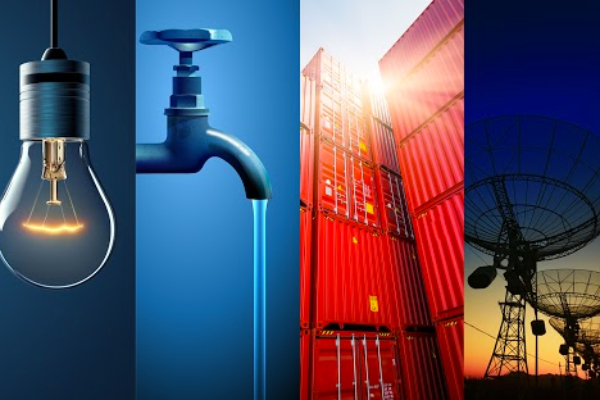Global Courant 2023-05-31 18:33:36
Image: state of the nation
Operation Vulindlela (OV), released yesterday by the presidency, shows further progress on reforms in several sectors since the last update in December, which covers the period up to the third quarter of 2002. Notably, the update reports that 10 of the 32 listed reforms have been completed, while one has been completed but still needs some intervention. Meanwhile, the report states that 10 reforms have either not yet started or are facing significant challenges, including several critical reforms in electricity supply and transportation logistics (emphasis added):
· Improvement of the energy availability factor to more than 70% (from about 55% currently);
Address inefficiencies in municipal electricity distribution (no specific measures have been announced);
· Address inefficiencies in municipal water distribution (no specific measures have been announced);
Improve port efficiency (private partners for the major infrastructure upgrade would have been announced much earlier this year, but now the deadline is the end of June); And
Implement third-party access to the freight rail network (some measures have been implemented, but the problems faced by rail freight are huge and multi-faceted)
In addition, the OV target of introducing a ‘fit-for-purpose’ procurement regime for state-owned companies, as announced in the last OV update, has also not started. However, the update also noted some key advancements in Q1 23, including (emphasis ours):
· The issuance at the end of March of an RFP for the purchase of a turnkey mining rights management system (which, as we previously reported, is expected to be completed by the end of the year);
· cabinet approval for switch-off date for analogue broadcasting (to free up spectrum, but has yet to be published); And
· Submission of the Electricity Regulation Amending Bill to Parliament (although there is no indication of how long it will take for Parliament to pass this important piece of legislation, without which much of the proposed energy sector reform cannot take place).
Furthermore, the OV update provided some information about reforms that need to be completed in the short term. However, most of the necessary reforms are complicated, multistep and time consuming, and it is only after completion of the reform in question that businesses and the economy at large will reap the most benefits. South Africa continues to make progress, but it remains sluggish on a number of fronts and some reform commitments – for example for labor markets – are not forthcoming.
The National Treasury reported yesterday that the main budget deficit in April was R67.5 billion. This is broadly in line with the Absa forecast of R68.4 billion and sharply higher than the deficit of R45.2 billion a year earlier in April 2022. The large budget deficit materialized as revenues grew by 8.8% in April on an annual basis fell from 10.6% yoy growth in March, although expenditure growth slowed from 14.6% yoy to 10.2% y/y. Among the major tax categories, PIT receipts increased 4.9% y/y, while VAT receipts decreased 10.1% y/y. April is the first month of FY23/24 and one should not draw firm conclusions about the full fiscal year based on April data alone. That said, even if Eskom debt relief is counted below the line, the Absa group forecasts the main budget deficit to reach 5.2% of GDP in 2023/24, compared to the NT target of 3.9% , given the likely revenue shortfall and pressure on Public Sector Pay Agreement spending and one-offs (see South Africa Quarterly Perspectives: No growth without power, 2 May 2023).
Yesterday, the SARB reported that bank lending growth to the private sector slowed for a third consecutive month from 7.2% year-on-year in March to 7.1% in April – the lowest level since July 2022. This result is higher than forecast of the company at 6.9% y/y but below the Thomson Reuters consensus of 7.3% y/y. Lending to both households and businesses slowed, suggesting that rising interest rates are starting to bite. Interestingly, however, there are signs of household defaults. In particular, credit card loans to households increased by 1.0% m/m sa, pushing the annual growth rate to 9.1% in April from 8.4% in March, although total household loans from banks slowed to 7.0% year-on-year in April against 7.2% in March. Meanwhile, corporate credit growth slowed by 0.1 percentage point to 7.1% year on year in April.
According to April international tourism data released yesterday by Stats SA, which showed tourist arrivals fell 5.5% m/m after a partial 1.5% increase in March from the 2.6% decline in February. Inbound tourism was 57,000 less than pre-pandemic levels (i.e. in 2019). Low tourist arrivals abroad bode badly for net current account travel revenues, supporting Absa’s view that the current account deficit will widen in Q2 2020 (see South Africa Q2 23 Quarterly Perspectives: No growth without power, May 2, 2023).
SARS will release April trade balance data at 2:00 PM today. According to the projection of the absa group, the merchandise surplus fell to R4.9 billion in April (Thomson Reuters consensus: R5.0 billion) from R6.9 billion in March, partly due to seasonal factors in the data. That said, there is a high degree of uncertainty surrounding the company’s forecast due to the hard-to-quantify effects of the ongoing shock on economic activity and supply chains.








